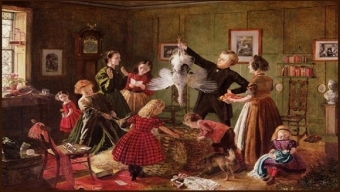Before the invention of refrigeration, meat was usually pickled in brine or smoked to preserve it over the winter months. This is where we developed our taste for ham, bacon and salami. In winter the pastures lay dormant or under a blanket of snow. Hay was cut and stored to feed the best animals over the bleak winter months and all but the best farm animals were slaughtered at the end of summer in a communal feast called Martinmas or Belhane – what we now call Halloween.
This was a great feast to use up any produce that could not be stored for the winter. Prime beef was salted or “corned” – hence the Corned Beef we use today. Pork was soaked in brine, then rubbed in salt and hung in the rafters over the fire which slowly smoked the meat into filches of bacon and hams. Fish was cleaned and split flat to be packed between layers of salt until it was dried then hung in the rafters. Small fish, too small to hang were stored in oil in large pottery jars called crocks, after salting.
Many vegetables were also preserved for the bleak winters. Caggage was pickled in brine (saurktaut), onions and small cucumbers in vinegar (gherkins and pickled onions) and other vegetables like cauliflower, carrots and turnips were chopped up and dropped into boiling vinegar, with herbs and stored in pottery jars of oil for winter – we call this anitpasta today.
Fruit was dried (eg figs and grapes), made into wine or like apples stored in the dark, to slow the ripening process.
All of these methods are successful ways of preserving foods and have given rise to many delicacies we eat today (bacon, ham, herrings, pickles, salami, olives, kippers, bakala, tinned fish, raisins etc). However in the damp cold middle ages, when homes were not heated like today and nowhere near as dry, often the meat was turning or “off” before spring and the addition of herbs helped add some taste. Even if the meat was good, it had to be boiled to reduce the salt preservative to a level that was palletable. This boiling usually removed any flavour along with the salt. Herbs added some flavour. Herbs like Cardamom that only came from the mystical “Orient” were often worth more than gold, by weight.




















